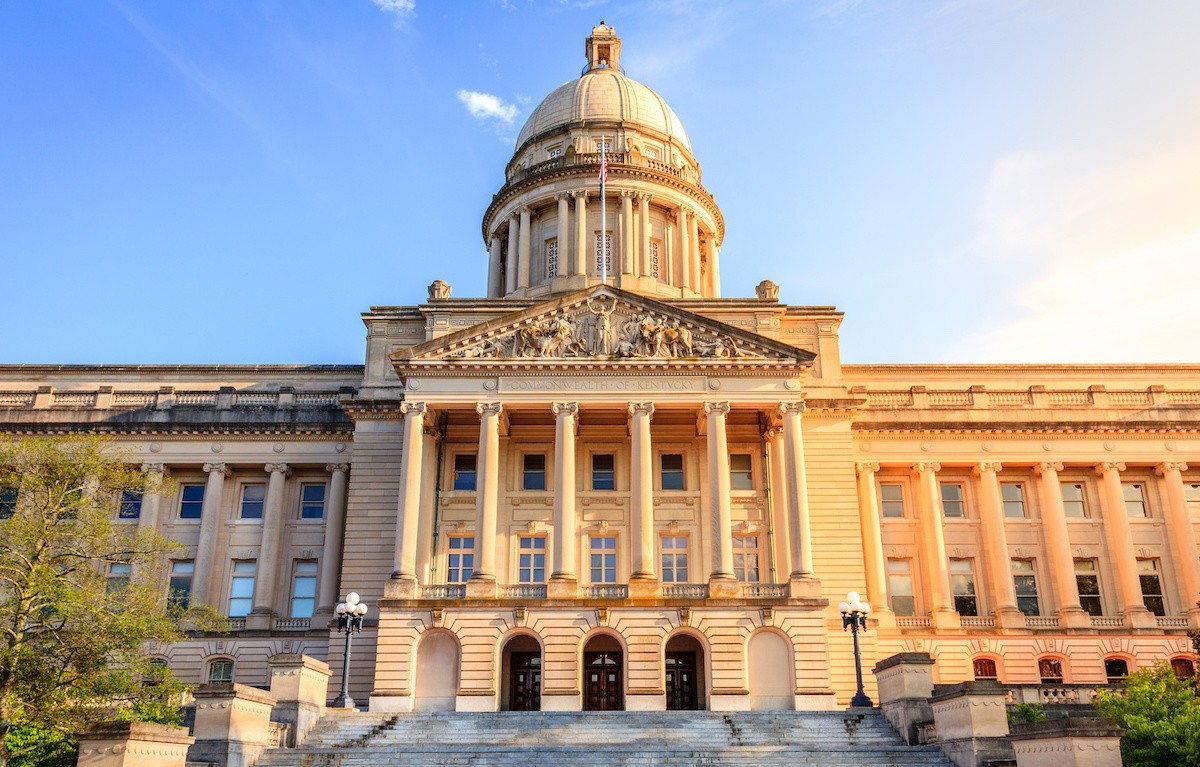The legislative session was dangerous in 2022, as the Generally Assembly grandstanded and waged ideological warfare, using a supermajority in both chambers to achieve all sorts of right-wing restrictions, regulations and changes. It’s been a long and grueling session, and it feels like a century has passed since redistricting, but here are five bills that recently received final passage and one that got close to making it to the finish line but died. Read at your own risk of going into the weekend super angry.
SB 83: Anti-Trans Sports Bill
In an unsurprising but still disappointing move, the Kentucky legislature voted Wednesday to override Gov. Andy Beshear’s veto of their ban on trans girls and women participating in sports corresponding with their gender. In an attempt to change the narrative on the bill, Republicans pulled some interesting moves.Bill sponsor Robby Mills invited a UK swimmer to speak to reporters: Riley Gaines claimed on “Tucker Carlson Tonight” that she was unfairly snubbed in favor of a trans athlete… who tied with her in a race… for fifth place. Where is the discrimination, you ask? Gaines said she was not given the fifth place trophy to pose with. Instead, she was given a sixth place trophy to hold, while her opponent received the fifth place trophy. Gaines was told she’d be given the proper trophy in the mail.
In addition to this, Sen. Damon Thayer claimed the bill as a win for the legislature in remarks on the Senate floor, fully embracing the idea that all press is good press by saying it was a “landmark bill that has gotten Kentucky national headlines.” National headlines? Try international. Like this one from the London-based Gay Times, “Kentucky governor Andy Beshear vetoes archaic anti-trans sports bill.”
SB 167: Politicizing Libraries?
Sen. Phillip Wheeler threw up some Richard Nixon style deuces on Thursday after the legislature successfully overrode a veto of Senate Bill 167. But many weren’t celebrating because they fear that the legislation will politicize Kentucky libraries.This is State Senator Phillip Wheeler after he finally passed his bill to destroy nonpartisan library boards and put public libraries under the complete control of partisan politicians. pic.twitter.com/Bfc6ogbmT4
— James Line (@jameslineky) April 14, 2022
The bill enables politicians, specifically county judge executives, to appoint members to library boards.
Supporters say the legislation is meant to provide more oversight to library boards, which do have taxation authority.
The bill’s passage was a surprise, because the same bill had failed to get enough votes the day before.
HB 604: A Cannabis Research Center
Republicans keep telling us they’re not ready to legalize marijuana until there’s more research. Well, they’re actually doing something about it: House Bill 604 sets up a cannabis research center at UK and gives it a cash influx of $2 million.For those tired of waiting, Gov. Andy Beshear has said that he’ll look into issuing an executive order to legalize medical marijuana in the state of Kentucky. The Kentucky General Assembly failed once again to pass its bill this session. It cleared the House but was held up in the Senate where it faces opposition from leadership.
HB 3: Anti-abortion Omnibus Bill
Kentucky’s two abortion providers have launched lawsuits after House Bill 3 went into law earlier this week. Planned Parenthood and EMW Women’s Surgical Center, the only two abortion providers that remain in Kentucky, have asked for an injunction, saying that the law, which went into effect immediately, is impossible to comply with given new procedural and reporting requirements.House Bill 3, a layered, omnibus bill sponsored by Rep. Nancy Tate (R-Brandenburg) amended state law to make it harder for minors to get abortions in cases when a parent is not able or qualified to provide written consent, as well as restricted access to abortion medication. It requires that fetal remains be disposed of by burial or cremation. It would also significantly up the reporting and eligibility requirements for abortion medication providers. (In their lawsuits, abortion providers said that numerous new forms required by the law are unavailable, making it impossible to comply with the law.) The Cabinet for Health and Family Services is now required to start a complaint portal that lists all abortion providers. A March amendment to the bill bans abortions after 15 weeks of pregnancy, overriding the former law that banned abortions after 20 weeks of pregnancy — similar to a controversial and legally-contested Mississippi law that’s currently being weighed by the Supreme Court. Several other states, such as Florida and Arizona, have mirrored the legislation that challenges Roe v Wade, as lawmakers on the state level wait for possible changes to national abortion rights.
“The Kentucky legislature was emboldened by a similar 15-week ban pending before the Supreme Court and other states passing abortion bans, including in Florida and Oklahoma, but this law and others like it remain unconstitutional,” said Brigitte Amiri, deputy director of the ACLU Reproductive Freedom Project. “We urge the court to block this law immediately and ensure that people in Kentucky can continue to access abortion care.”
SB 1: Anti-CRT and Limiting School Council Powers
SB 1 moves the selection of principals and curriculum decisions from school councils to superintendents. It also puts restrictions on how history can be taught, especially concerning race, and it also mandates certain texts, such as important, early U.S. docs like the Constitution, texts on civil rights including Martin Luther King Jr.’s “Letter from Birmingham Jail… and Ronald Reagan’s small government treatise “A Time Of Choosing” speech.Although the General Assembly passed late additional legislation to walk it back, SB1 included Class A misdemeanors for teachers who violate parts of the bill. A sponsor of the bill, Sen. Max Wise, a Republican from Campbellsville, called it “a drafting oversight.” Because the General Assembly cannot amend a bill that has been vetoed, they passed House Bill 44, which would counteract the penalties in SB1.
HB 606: Sports Betting
Like medical marijuana, sports betting got some traction in the General Assembly this year, but was eventually stalled out by Senate leadership.There was a late push for House Bill 606, which would have allowed the racing commission to institute sports wagering in Kentucky. The House passed the bill by a 58-30 vote. Shortly afterward, Senate President Robert Stivers said that he didn’t see it as important, and he said that the bill doesn’t seem to have a lot of support in the Senate. It received a reading in the Senate, but died well before it could have received a vote from the full chamber.
But, with Churchill Downs building another casino-like venue in Louisville, this time downtown, it seems likely that it’s just a matter of time until Kentucky matches the sports and table gambling legislation of other states that’s in a domino effect across the country.
Keep Louisville interesting and support LEO Weekly by subscribing to our newsletter here. In return, you’ll receive news with an edge and the latest on where to eat, drink and hang out in Derby City.
Follow us on Facebook, Twitter and Instagram.







